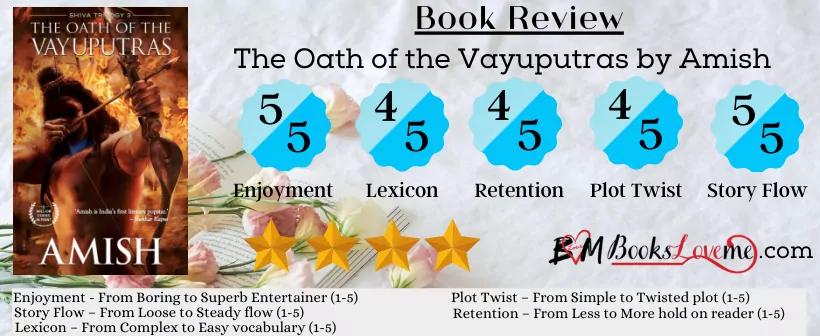In The Oath of the Vayuputras; final book of the epic saga, Shiva is here to face his real enemy. After a series of secrets unveiling, Shiva finally understands things much better.

He took up the role of Neelkanth and has reached the Capital of Nagas – Panchavati. He has to now face a man whose name sends chills down the people’s spine.
Shiva is powerful and the war is bigger than ever. The battle is necessary to save the very soul of the nation.
There will be loss, death and a lot of misery. But Shiva should not halt for the greater good. The Mahadev finally accepted that he is the saviour people are looking for.
And the responsibility to save India rests on his shoulders. People are looking up to him and waiting for a miracle.
In his desperation to save the Country, he turns to those people who never lent him a helping hand – The Vayuputras. But it is not easy to please people of the ancient tribe.
They have to believe that the real Neelkanth is here to save the day. Shiva has to collaborate with new friends, discover new things and finally face the enemy.
But at what cost? How will the battle effect Neelkanth, his family, his close ones and India on a whole? What does it take to battle the evil? Such questions get their answers in the final instalment of the ‘Shiva Trilogy’. It is time to blow the battle conch.
Table of Contents
Author of The Oath of the Vayuputras: Amish
He is a common man who wanted his story to find a proper platform. Amish Tripathi is an Indian author, columnist and Diplomat.

Amish was born in Mumbai and grew up in Odisha. He is the creator of ‘The Shiva Trilogy’, ‘Scion of Ikshvaku’, Sita: Warrior of Mithila among others.
His latest release was ‘Legend of Suheldev: The King Who Saved India’. The books in the Shiva Trilogy were the fastest selling sensations in the country.
People loved the way he brought mythological characters into a backdrop of fiction. People appreciated his depiction of Lord Shiva as a wanderer who rises in Power.
Amish was part of the 50 Most Powerful Indians List in 2019 by India Today. He also has a consistent spot in the Forbes India Top 100 Celebrities in India.
Amish was a graduate from IIM Calcutta and worked for 14 years as a Banker. He took a leap of faith and published his book – ‘The Immortals of Meluha’ that became an overnight sensation.
He comes from a conservative Indian family. Mythology has always been a part of their Dinner conversations.
That prompted him to write a story around the life of ‘Lord Shiva’ and then there was no looking back for him.
Even the books he wrote after the Shiva Trilogy talk about Indian Gods like – Sita, Rama and their arch enemy – Ravana. His books have translations in almost 17 different languages.
The Oath of the Vayuputras Book Review
If we go for a quick recap of the previous books, they dealt with the journey of Shiva in Meluha. A Tibetan tribe moves to Meluha post a deadly attack in their region.

Shiva and his people find Meluha to be a strange place because of their strict norms. But they soon blend in and understand their way of living.
Meluhans stay healthy and their life span increases after they drink the somras. But the magical drink has many untold stories associated with it.
Shiva’s throat turns blue as soon as he drinks the Somras. The people declare him as their saviour – Neelkanth. He supports the king of Meluha to fight off their deadliest enemies – The Nagas.
But during the second book, Shiva realizes that the Nagas are not evil like the Meluhans painted them.
Their living standards and deformed bodies make them different from Meluhans. Even they believe in the story of Neelkanth and want the blue-throat God to come rescue their people.
Somehow, the Nagas are losing their loved ones and children to early death.
The Saraswati River is drying up and the Nagas are developing deformed bodies as they grow up.
Shiva has to find the answers to so many questions in ‘The Oath of the Vayuputras’. He has to find the ‘wrong’ that is pitting the neighbours against each other.
With his lady love and ardent followers by his side, will Shiva fight the battle for justice and win? That forms the story of the last book.
The Characters and the Writing Style
Mr Tripathi took the constructive criticism that his 2nd book received in a positive way. You can see that reflected in his final instalment.
He fastened the pace of writing and only focused on the important points that will shape the story.
The story takes off from where he left it in the 2nd book and there is enough action to keep you hooked.

He tried to drop some motivational life lessons here and there, but that doesn’t disturb the flow. He shows the contemporary troubles through Shiva’s point of view.
That is going to give you the ‘History Repeats’ feel for sure. New characters walk into the story and they won’t disappoint you with their presence.
The Vayuputras have a different character sketch when compared to the actual Mythology.
These are strong-willed individuals who will only bow to the successor of Rudra. Also, the author tries to club ancient civilizations with mythology.
That’s a brave move that didn’t go wrong with the readers. You will see different characters making unjust choices and walking the wrong path.
The writer leaves the art of ‘judgement’ to the readers. He only concentrated on shaping his characters as believable as possible.
The females are not left to stay within the four walls of the house. There is enough action from the female leads and her associates.
There is love, loss, search, struggle and sacrifice in this story. Now that Shiva stepped into the shoes of a leader, he fights to serve justice.
The Vayuputras
The Oath of Vayuputras is bigger when it comes to the story backdrop and also the number of pages. And the main concept of this one is The Vayuputras.
The people are not ready to settle for anything less than what they want. They are strong, disconnected from the world, but still stand by their morals.
They are the true devotees of the previous Mahadev, Rudra. Fighting a war means destruction in great amount.
Shiva is aware of this. When all ways seemed to have closed, Shiva finds the solution of The Vayuputras. He needs them to get a deadly weapon that can destroy ‘evil’ without mass destruction.
You will have to read the book to know how. But seeing how the Vayuputras do not bow to anyone except the Mahadev, they are doubtful about Shiva.
They have to know if this man is the real successor of Rudra. Well, the kick in the story is the association of Shiva with Vayuputras at a more personal level.
That’s what makes them finally believe that Shiva is the man, he is the Mahadev. After you read the book, you’ll realize that the Vayuputras didn’t take up much of the page space.
But it seems like their presence is prominent throughout the story. I guess that’s why the author named the book after them.
The Vayuputras do not influence the war by physical presence, but they are the reason the tables turn.
Finding the Connection
Most of us are aware of the story of Lord Shiva. We know how he turned from a wanderer to a committed Husband. But if you want to enjoy The Oath of the Vayuputras, you have to forget the real story.
Think of the Meluha series as a redefined story with the same characters in a different light.
We know that Veer Bhadra is a part of Lord Shiva and took shape when the Mahadev was in agony. But in this book, Veer Bhadra is a different character altogether.
The same happens with Kali and Sati. Both of them are two different individuals. Then comes the confusion between Rudra and Shiva.
While Rudra is a synonym that we use for the Mighty God in real life, he happens to be the previous Mahadev. Imagine – there are two Mahadevs here.
But this is fiction and the writer has the pen in his hands. He can weave the words how he wants as long as it is beautiful to read. And yes, the final book is beautiful.
If you can put aside your previous knowledge and look at this one as a new tale, then it’s great.
It is good to not connect these books with the actual mythological tale. Then comes the terminologies that the people use.
The Vasudevs have a great knowledge about the composition of air and the act of breathing.
The scientific terms that they use to explain things to Shiva is too contemporary. It’s hard to understand when this story is actually happening.
What I like the Most
When I read the Nagas, I found the story going slow and unsteady. It was all bad editing and the story suffered as a result. But the Oath of the Vayuputras is different.
The editing is much better and the story is not stale. You have enough action to keep you motivated to read further. Then there is the ‘secret unveil’ trick that Mr. Tripathi sticks to.
Well, you do have your share of ‘Wow’ moments in the book. The female characters are strong and they steal the limelight in a few pages.
Sati is the true epitome of female patience and strength. Then there is Kali. She follows Shiva like a true warrior and is not scared to face some swords.
The overwhelming ending adds a true sense of closure to the story. All that you have with you is – Peace. Everyone reaches their rightful destinations.
You find minor similarities to the actual mythology. The author succeeds in bringing out strong emotional response from the readers. The oath of the Vayuputras and the story will stay on your mind even after you complete reading it.
What I didn’t Like
The first few pages of the book give a different impression of the course. I was a little bored at the start.
Also, the author uses the words ‘good’ and ‘evil’ so much that you get fed up of it. We get his point, but he still tries to emphasize it when it is not required.
The repetition makes you question if it is only to fill the pages. Shiva finally understands his importance in the whole scenario. But that leaves us with questions as readers.
Some revelations are a little unconvincing because there could have been better alternatives. And even Shiva himself questions a few situations.
Well, I am with him there. The wise men then state that ‘It is the magic of the Universe’. My practical mind took some time to register that ‘magic’.
But the ending is a result of the whole journey and the choices. That’s where you get the feel that ‘Yes, that’s understandable’.
But while reading the book, you will have contradicting thoughts.
Conclusion of the Oath of Vayuputras
The Journey of Shiva has come to an end and that too, a peaceful one. He fought for what he believed, loved without conditions, gave life to worthy children.
He destroyed the ‘evil’ and now knows that he fulfilled the purpose of his life. You will fall in love with Shiva’s thoughts and interpretations.
You will cherish his journey and without a doubt, this book is a very good ending for a brilliant start. If you’ve been a fan so far, you won’t regret reading this book. Kudos to Shiva and is followers!
Like it? Explore more Fiction Books.
If you love reading fantasy books, I would recommend you to read The Alchemist.
